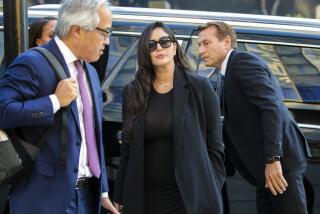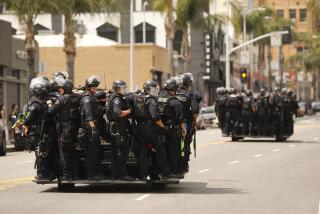Huge Award to Smoker Cut by Judge
- Share via
A Los Angeles judge ruled Thursday that a $3-billion award against cigarette maker Philip Morris was excessive but said he will order a retrial only if the cancer-stricken plaintiff declines to accept a record-breaking $100 million in punitive damages.
An attorney for plaintiff Richard Boeken said his client will decide in the next two weeks whether to accept the award. The tobacco company says it will aggressively appeal the ruling.
In his decision, Superior Court Judge Charles W. McCoy Jr. reprimanded the tobacco company for going to “extraordinary lengths to hide its own scientific information” about the health risks of smoking. Besides offering 56-year-old Boeken the $100 million in punitive damages, the judge upheld an additional $5.54 million in compensatory damages for the Marlboro smoker who suffers from lung cancer.
“Philip Morris’ conduct was in fact reprehensible in every sense of the word, both legal and moral,” McCoy wrote.
Although the ruling gives Philip Morris some relief, the case remains a solid defeat for the tobacco industry. The award is the largest judgment against a tobacco company in a lawsuit brought by a single smoker. Company lawyers had expressed hope in court papers that the judge would reduce the punitive award to $25 million.
The case is the second in which a California judge has cut a damage award against Philip Morris. A San Francisco jury ordered the cigarette maker to pay lung cancer victim Patricia Henley $51.5 million in 1999, but a judge later reduced that award to $26.5 million. The case is under appeal.
Attorneys for the tobacco company said they believe the award was “both unprecedented and unconstitutional.”
“Our appeal will request a complete reversal and retrial on multiple grounds, not the least of which was the passion and prejudice the jury displayed in reaching its verdict,” said William S. Ohlemeyer, Philip Morris vice president and associate general counsel, in a written statement.
“It’s simply not believable that anyone living in America for the past 40 years could testify under oath that they were unaware of the risks of smoking. For these and a multitude of other reasons, this verdict should be reversed.’
Boeken’s attorney, Michael Piuze, said he was grateful that the judge disregarded the tobacco firm’s arguments, but disagreed with the reduction of punitive damages.
“One hundred million [dollars] is a lot of money for Mr. Boeken, but it is not a lot of money for Philip Morris and the idea of the verdict is to punish Philip Morris,” Piuze said. “I think it would have been more productive for society to let the verdict stand.”
During the trial that began in April at the Central Civil West courthouse, Piuze argued that the company lied to smokers and the government about the dangers and addictiveness of smoking. The tobacco company’s lawyers countered that any public statements by the industry were overwhelmed by anti-smoking campaigns of health groups and government agencies.
A jury awarded the $3 billion to the Topanga resident in June. The jury found Philip Morris, the country’s biggest cigarette maker, guilty on all eight of Boeken’s claims, including negligence, misrepresentation, fraud and selling a defective product.
In his 27-page decision Thursday, McCoy wrote that Philip Morris’ conduct had “devastating and widespread consequences” and that the firm “refused to accept even a scintilla of responsibility for the harm it has done to Richard Boeken and other similarly situated consumers.”
He explained that Philip Morris knew by the early 1960s that nicotine in cigarettes was highly addictive and that the tar causes lung cancer. Yet the firm, along with other major American tobacco companies, consistently claimed that cigarettes were neither addictive nor disease-producing. Philip Morris also targeted its advertising at children and underage smokers, McCoy wrote.
Despite his strong words, McCoy said that the $3-billion punitive damages award was legally excessive and was disproportionate to the compensatory damages traditionally given for medical relief and lost earnings. The ratio of the jury verdict was 540 to 1, and McCoy cut it to 18 to 1. Until Thursday’s decision, McCoy wrote, no reported case with more than $1 million in compensatory damages had ever surpassed a ratio of 3 to 1.
McCoy also wrote that in making his ruling, he took into consideration the fact that Philip Morris will likely face other large punitive damage awards in future trials around the nation.
Boeken, a self-employed dealer in oil and gas securities, smoked for 40 years before he was diagnosed in 1999 with lung cancer that has since spread to his brain. He reportedly became hooked on Marlboro cigarettes as a teenager in the 1950s, when there were no warnings on cigarettes and smoking was considered “cool.”
Boeken must agree in writing to the $100-million award by Aug. 24, or Philip Morris will be granted a new trial on the punitive damages.
After the trial, jurors said they believed the enormous damage award would hurt Philip Morris and force the firm to take responsibility for their product and conduct.
In their bid for a new trial, attorneys for Philip Morris argued that the judge should have admitted evidence about Boeken’s prior criminal record that would have thrown his credibility into question. Boeken has three felony convictions from cases involving stolen property, drug possession and fraud stemming from an oil and gas selling scheme.
Boeken’s lawyers countered that his legal indiscretions occurred years ago and had no bearing on the case. More important, Piuze said, was the company’s consistent lies about cigarettes.
Richard Daynard, head of the anti-industry Tobacco Products Liability Project in Boston, said the award against the “humongous money-making machine . . . sets an example for any company in the future that would attempt a massive, deadly scam like this.”
Columbia Law School professor John Coffee said the reduction of damages leaves more money available for future cases against the cigarette company.
“It’s kind of a zero-sum game between this smoker and other smokers,” he said. “The industry is not good for an infinite number of $3-billion awards. But the ultimate question is if the punitive damages should go to a few individuals who have a lucky windfall in a legal lottery or to some broader social purpose.”
Tobacco companies were immune from product liability lawsuits in California for a decade until 1997. Since the ban was lifted that year, juries have dealt blow after blow to the industry.
The first was the 1999 San Francisco case against Philip Morris that resulted in a $26.5-million award for Patricia Henley, a former Marlboro smoker and lung cancer patient. The second was a $21.7-million verdict against Philip Morris and R.J. Reynolds Tobacco in another San Francisco case brought by a cancer victim. The Los Angeles case brought by Boeken was the third. Both San Francisco cases are on appeal.
*
Times staff writers Steve Berry and Myron Levin contributed to this story.
More to Read
Inside the business of entertainment
The Wide Shot brings you news, analysis and insights on everything from streaming wars to production — and what it all means for the future.
You may occasionally receive promotional content from the Los Angeles Times.










